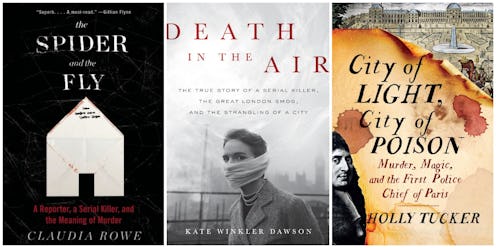
My Favorite Murder has, in the last few years, become everyone's favorite podcast, capitalizing on our collective obsession with true crime and all things twisted. I've picked out nine true crime books you need to read if you love My Favorite Murder, because the podcast can't possibly cover every great, grisly tale that's out there.
Hosted by Karen Kilgariff and Georgia Hardstark, My Favorite Murder is a weekly podcast devoted to telling the true stories behind the weirdest, most sensational murder cases in history. Kilgariff and Hardstark do their research, but they aren't as interested in creating academic content about these murder cases as they are about the fun of exploring the dark recesses of the human mind.
With more than 100 episodes as of this writing, My Favorite Murder has examined a number of prominent murder cases and "cult favorite" killings — those less-talked-about murders that both fascinate and horrify the people who know of them. Included in this latter category are the Mary Flora Bell case, Bella in the Wych Elm, and the murder of Sylvia Likens.
Murderinos — My Favorite Murder's diehard fanbase — will love the nine true-crime books on the list below, which deliver the thrills and chills of Kilgariff and Hardstark's podcast in more detail than the hour-long episodes can provide.
'The Spider and the Fly' by Claudia Rowe
Through snail-mail correspondence, Seattle Times reporter Claudia Rowe built a rapport with Kendall Francois, a serial killer who targeted sex workers in Poughkeepsie, N.Y., but who kept famously mum about his crimes. Francois used Rowe's interest to his advantage, attempting to seduce her.
'Midnight in the Garden of Good and Evil' by John Berendt
One of the most famous true-crime books ever written, John Berendt's Midnight in the Garden of Good and Evil is a must-read for any My Favorite Murder fan. The story here concerns Danny Hansford, a sex worker shot and killed by Jim Williams, a member of Savannah's elite, who would ultimately face four different murder trials for the other man's death.
'The Grim Sleeper' by Christine Pelisek
From L.A. Weekly reporter Christine Pelisek comes The Grim Sleeper, which profiles how eponymous serial killer Lonnie D. Franklin, Jr. was able to murder at least 25 women over three decades, simply because no one was interested in investigating the deaths of crack-addicted sex workers in South Central L.A.
'The Blood of Emmett Till' by Timothy B. Tyson
Less a deep dive into the circumstances surrounding the 1955 murder of 14-year-old Emmett Till, Timothy B. Tyson's The Blood of Emmett Till is an examination of how those same circumstances continue to be present in the U.S. today.
'Death in the Air' by Kate Winkler Dawson
For five days in December 1952, London was overtaken by a thick, dangerous smog that killed thousands of people and animals. At the same time, serial killer John Reginald Christie lurked in the foggy shadows, hunting his next victims.
'The Good Nurse' by Charles Graeber
In the early 2000s, after 16 years working as a nurse, Charlie Cullen was arrested and charged with the murders of his patients. The Good Nurse author Charles Graeber notes that Cullen may have killed hundreds of people, which would make him the country's most successful serial killer, but Cullen has only ever admitted to killing a few dozen.
'Little Shoes' by Pamela Everett
In 1937, three little girls were abducted, raped, and murdered in Inglewood, Calif. A local crossing guard, Albert Dyer, was arrested and hanged for their deaths. In Little Shoes, Pamela Everett questions whether the authorities executed the real killer.
'Ugly Prey' by Emilie Le Beau Lucchesi
The first woman Chicago ever sentenced to hang was an Italian immigrant mother who was wrongfully convicted of killing her missing husband. In Ugly Prey, Emilie Le Beau Lucchesi examines how ad hominem attacks on Sabella Nitti's looks helped to convict her, and how a prison makeover saved her life.
'City of Light, City of Poison' by Holly Tucker
Focusing on Paris' first police chief, Nicolas de La Reynie, City of Light, City of Poison author Holly Tucker investigates how the deaths of two top criminal justice officials in the 17th century led to criminal reforms, streetlamp installations, and one of the deepest, broadest manhunts in French history: the Affair of the Poisons.